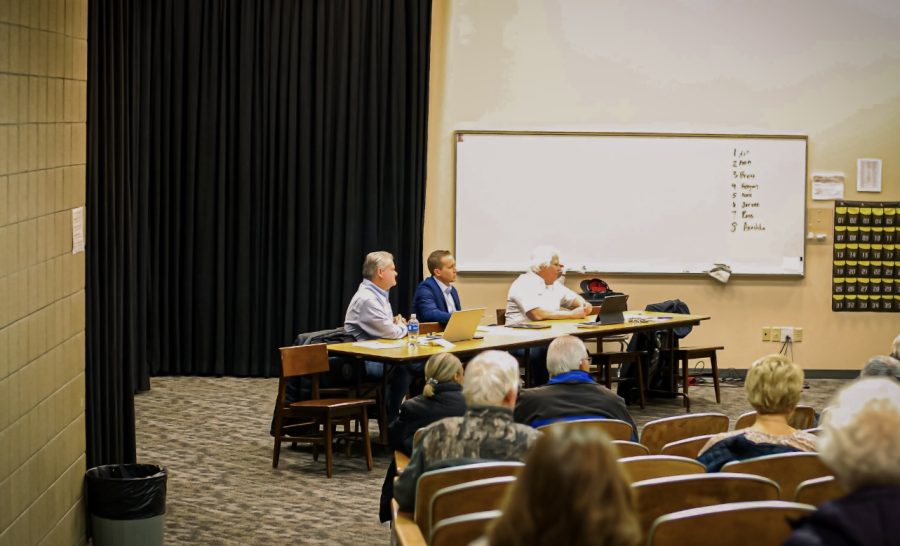A Legislative Update
April 5, 2023
On April 1st, Senator Jeff Barta and Representative Eric Murphy of the North Dakota Republican Party, with Representative Zac Ista of the Democratic Party guiding discussion, came to Grand Forks to address questions and issues brought forth from our communities. The topics ranged from the shortage of teachers in our state to LGBTQ+ rights.
The first issue brought forth about education was regarding bill 1532, which would allocate public funds to create a voucher program for private schools. The bill would pay up to 30% of the private school attendees’ tuition. Several community members took issue with the bill arguing that public schools provide a level playing field for all students, despite differences in religion, physical or mental ability, class, etc. In contrast, the bill would reward private schools that are not required to follow such requirements. A proposed alternative was allocating those funds to special education and mental health services to increase equal education for all to which Senator Barta stated that those issues would have to be part of the ongoing conversation. Representative Murphy, who responded to this issue later in the meeting, stated that he thought it was a bad bill without necessary checks and balances. According to Murphy, “public education is what’s made our country great” as well as higher education.
Continuing along this line of support for the public-school systems, Representative Murphy addressed the teacher shortage in North Dakota with a program he saw as increasing the number of teachers in the state. This program would make it easier for paraprofessionals to earn degrees and make their way towards becoming a teacher themselves. Such programs have already been rolled out in Mayville and Vally City State, Murphy hoped that NDSU and UND would soon follow.
Another issue brought up was regarding the curation or censorship bills such as HB 1205 and Senate bill 2360. Senator Barta was in support of these bills that would restrict what Barta called the “willful display” of inappropriate material such as the controversial book “Let’s Talk About It: The Teen’s Guide to Sex, Relationships, and Being a Human.” The original proposal included sexual identity as a censured topic, however, the revision only prohibits “explicit sexual material” as defined by the legislators. Senator Barta argued that they would follow the Miller test, the three-prong obscenity test, to determine what books to prohibit. In response, a librarian who wrote on the Miller test for her orals for her master’s degree argued that the test was irredeemably flawed. She and some others saw it as a disregard for the separation of church and state as the Bible with its explicit references to rape, slavery, incest, and murder was most likely not in the legislators’ list of prohibited books under these bills but other books about LGBTQ+ orientations most likely would be. Again, several community members took issue with the bill as they stated it was redundant as librarians already follow curation guidelines. They saw the bill as micromanaging the library system as well as what Representative Murphy said, “putting the morality on the plurality,” which he defined as imposing a narrow moral view on issues that many people naturally differ on. Besides the cost of enforcing such a bill, the community members argued that even conservative North Dakotans did not want such a bill as they were overwhelmingly against such censorship according to recent polls. Representative Murphy did not vote for the bill as he did not like the implication that our public and school libraries should be treated as if they were “adult bookstores” and found it to be too restrictive.
The Senate bill 2247, which restricted the training of “divisive concepts” in universities, was also brought up by Representative Murphy who called it “tremendously problematic” but saw the revisions to it as neutralizing most of its harm. He mentioned hoping to challenge the bill again sometime in the future.
Many community members brought up what they saw as hostility on the legislators’ part towards the LGBTQ+ community. They argued that North Dakota legislators need to stand up for the vulnerable groups in their state. Senator Barta did not provide his position on other LGBTQ+ issues except that he supports the individual. Representative Ista praised Representative Murphy for his general stance on LGBTQ+ rights as he saw his party (Democratic) as generally taking the lead on accepting and supporting members of those communities. Representative Murphy agreed with the community members’ complaints and mentioned he saw lots of the intolerance towards LGBTQ+ issues based out of the ultra-right wing of the Republican party out of the western part of the state. He thought that the state should not dictate what goes on in people’s bedrooms. He stated that people don’t have to understand other people’s sexual identities and orientations to accept them and thus he voted on each of the pro LGBTQ+ bills except for ones supporting transgender women in women’s sports. Both Representative Murphy and Senator Barta stated they supported women’s athletics.
Overall, Senator Barta was in support of many of the bills that the community members of Grand Forks took issue with such as the private school voucher program and the library curation-censorship bill among others. Representative Murphy, who self-described as “in his own world,” regarding the usual Republican approach to social issues and the usual Democratic approach to economic issues, agreed with many of the community members except for the issue regarding transgender women in women’s sports. The discussion was run smoothly by Representative Ista and, perhaps in a truly North Dakotan way, the discussion was had with respect and understanding for a multitude of views. Unfortunately, the community members present were few; an issue that could be resolved by greater participation in politics from college students.
Kira Symington is a Dakota Student General Reporter. She can be reached at kira.symington@und.edu.


